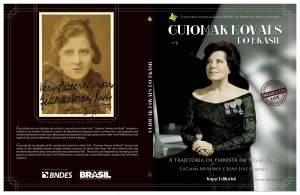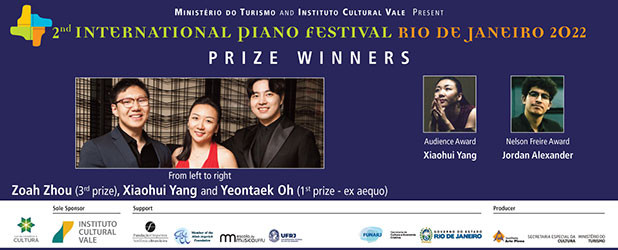João Marcos Coelho’s criticism in the Estado de São Paulo of the BNDES International Piano Festival and the book ‘Guiomar Novaes of Brazil’
Nov 26, 2011

In this Saturday’s Estado de São Paulo newspaper, the critic João Marcos Coelho writes about the BNDES International Piano Festival and the book Guiomar Novaes of Brazil, by Luciana Medeiros and João Luiz Sampaio, that will be launched this Sunday, November 27, at 11 a.m, with a recital by the Russian pianist DaniilTrifonov in the Rio de Janeiro Opera House. “Do the book and the recordings now brought before the public for the first time add to the biographical and professional information about Guiomar Novaes, and above all to Guiomar as an interpreter? In both cases the answer is most certainly yes”. See below the main passages of the article:
Do the book and the recordings now brought before the public for the first time add to the biographical and professional information about Guiomar Novaes, and above all to Guiomar as an interpreter? In both cases the answer is most certainly yes. To begin with, anything relating to Guiomar Novaes is a motive for celebration, as more than thirty years after her death, in March 1979, we still know very little about this extraordinary pianist, who is rightly placed among the greatest of the 20th century.
Reading this book is also an indication that fortunately we have gone beyond the point of mere fan admiration in this type of literature. Guiomar Novaes of Brazil inaugurates a new era of selective, objective research about the pianist, focussing above all on her years in the United States, which represent over half a century of intense activity. Much of the data collected by Sampaio and Medeiros speaks for itself: between 1916 and 1966 she presented 27 different programmes in 51 concerts with the New York Philharmonic. During this period she was conducted by such distinguished maestros as Wilhelm Furtwängler, John Barbirolli, George Szell, André Cluytens and Leonard Bernstein.
….
As can be imagined, everyone writing in the North American press wanted to decipher the Guiomar Novaes enigma. Noel Straus, for example, defined her as belonging to the “class of pianists with more vivid imagination that tend to recreate a given composition differently at each presentation of it, according to the mood of the moment.”
In other words, intuitive, like Nelson Freire today. Straus came very close. However, on page 131 Sampaio and Medeiros seem not to agree with this “picture of a purely intuitive artist, unable to articulate her art in an intellectual way.” And whom do they quote? Precisely Nelson Freire, another intuitive artist who cannot, or rather does not wish to, explain his art. He prefers to demonstrate it by playing, like Guiomar. Freire never repeats an interpretation. He is not like those musicians who prepare an interpretation of a piece of music and then freeze it. A point to Guiomar and a point to Neslon, without a doubt.
…..
To sum up, he and she, with identical DNA, offer the “mood of the moment” on the stage. And it is here that the charm and geniality of Guiomar lie – and those of Nelson. He also shares with her his relationship with the instrument. “Pianos have a soul,” she says. “This piano doesn’t like me,” Nelson observes, looking distrustfully at the Steinway in the Sala São Paulo in João Moreira Salles’ documentary.
There is still a lot missing before we have a complete picture of Guiomar Novaes. There are still people who have important collections about her, but in their provincial way think they are the ‘owners’ of this documentation to which the world has a right. This book and the two CDs, without a doubt, mark the beginning of more professional research into the “country of pianists” as Mário de Andrade would have said.’ / J.M.C.

